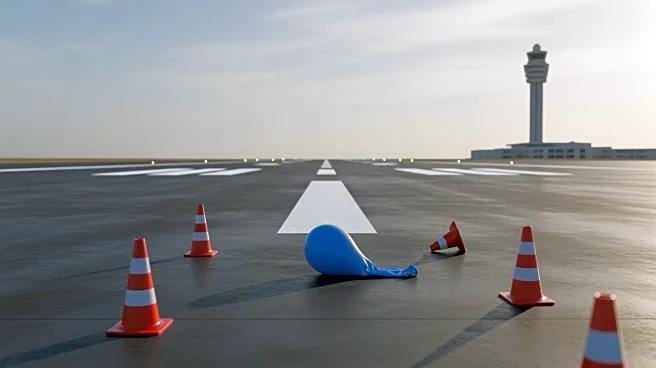What's Happening?
Flights at Lithuania's main airport were disrupted for two consecutive nights due to suspected sightings of balloons used to smuggle cigarettes from Belarus. On Saturday, air traffic at Vilnius Airport
was suspended from 9:35 p.m. until 3:30 a.m. Sunday, resulting in four flight cancellations and seven diversions. Similar disruptions occurred on Friday night, affecting Vilnius and Kaunas airports, leading to ten cancellations and four diverted flights. Lithuania's border crossings with Belarus at Medininkai and Šalčininkai were closed for several hours due to these incidents. Prime Minister Inga Ruginienė has warned of potential longer-term border closures and is considering tougher penalties for smugglers. A meeting of Lithuania's National Security Commission is scheduled to discuss possible measures, with the government issuing warnings to Belarus about the consequences of disrupting strategic facilities.
Why It's Important?
The incidents highlight ongoing tensions between Lithuania and Belarus, impacting Lithuania's transportation infrastructure and security. As a member of the European Union and NATO, Lithuania's response to these disruptions is significant for regional stability and security. The use of balloons for smuggling illegal cigarettes poses challenges to border security and law enforcement, potentially straining diplomatic relations with Belarus. The situation underscores the need for effective cross-border cooperation and enforcement measures to prevent illegal activities that threaten national security and economic interests.
What's Next?
Lithuania's National Security Commission will convene to discuss potential measures in response to the balloon incidents. The government may consider extending border closures and implementing stricter penalties for smugglers. Diplomatic communications with Belarus are likely to intensify, with Lithuania seeking assurances to prevent further disruptions. The situation may prompt broader discussions within the EU and NATO regarding regional security and cooperation in addressing cross-border smuggling and other illicit activities.
Beyond the Headlines
The use of balloons for smuggling highlights innovative methods employed by criminal networks, necessitating adaptive strategies by law enforcement. The incidents may lead to increased investment in surveillance and border security technologies. Additionally, the situation raises ethical and legal questions about the balance between security measures and maintaining open borders for legitimate trade and travel. Long-term implications could include shifts in regional security policies and increased collaboration among neighboring countries to address shared challenges.









